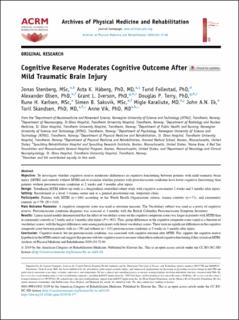| dc.contributor.author | Stenberg, Jonas | |
| dc.contributor.author | Håberg, Asta | |
| dc.contributor.author | Follestad, Turid | |
| dc.contributor.author | Olsen, Alexander | |
| dc.contributor.author | Iverson, Grant L. | |
| dc.contributor.author | Terry P., Douglas | |
| dc.contributor.author | Karlsen, Rune Hatlestad | |
| dc.contributor.author | Saksvik, Simen Berg | |
| dc.contributor.author | Karaliute, Migle | |
| dc.contributor.author | Ek, John Andre Nebb | |
| dc.contributor.author | Skandsen, Toril | |
| dc.contributor.author | Vik, Anne | |
| dc.coverage.spatial | ª2019 by the American Congress of Rehabilitation Medicine. Published by Elsevier Inc. This is an open access article under the CC BY-NC-ND license (http://creativecommons.org/licenses/by-nc-nd/4.0/). | en_US |
| dc.date.accessioned | 2020-03-23T16:15:57Z | |
| dc.date.available | 2020-03-23T16:15:57Z | |
| dc.date.created | 2019-12-23T13:27:21Z | |
| dc.date.issued | 2019 | |
| dc.identifier.citation | Archives of Physical Medicine and Rehabilitation. 2019, 101 (1), 72-80. | en_US |
| dc.identifier.issn | 0003-9993 | |
| dc.identifier.uri | https://hdl.handle.net/11250/2648213 | |
| dc.description.abstract | Objective
To investigate whether cognitive reserve moderates differences in cognitive functioning between patients with mild traumatic brain injury (MTBI) and controls without MTBI and to examine whether patients with postconcussion syndrome have lower cognitive functioning than patients without postconcussion syndrome at 2 weeks and 3 months after injury.
Design
Trondheim MTBI follow-up study is a longitudinal controlled cohort study with cognitive assessments 2 weeks and 3 months after injury.
Setting
Recruitment at a level 1 trauma center and at a general practitioner-run, outpatient clinic.
Participants
Patients with MTBI (n=160) according to the World Health Organization criteria, trauma controls (n=71), and community controls (n=79) (N=310).
Main Outcome Measures
A cognitive composite score was used as outcome measure. The Vocabulary subtest was used as a proxy of cognitive reserve. Postconcussion syndrome diagnosis was assessed at 3 months with the British Columbia Postconcussion Symptom Inventory.
Results
Linear mixed models demonstrated that the effect of vocabulary scores on the cognitive composite scores was larger in patients with MTBI than in community controls at 2 weeks and at 3 months after injury (P=.001). Thus, group differences in the cognitive composite score varied as a function of vocabulary scores, with the biggest differences seen among participants with lower vocabulary scores. There were no significant differences in the cognitive composite score between patients with (n=29) and without (n=131) postconcussion syndrome at 2 weeks or 3 months after injury.
Conclusion
Cognitive reserve, but not postconcussion syndrome, was associated with cognitive outcome after MTBI. This supports the cognitive reserve hypothesis in the MTBI context and suggests that persons with low cognitive reserve are more vulnerable to reduced cognitive functioning if they sustain an MTBI. | en_US |
| dc.language.iso | eng | en_US |
| dc.publisher | Elsevier | en_US |
| dc.rights | Attribution-NonCommercial-NoDerivatives 4.0 Internasjonal | * |
| dc.rights.uri | http://creativecommons.org/licenses/by-nc-nd/4.0/deed.no | * |
| dc.title | Cognitive Reserve Moderates Cognitive Outcome After Mild Traumatic Brain Injury | en_US |
| dc.type | Peer reviewed | en_US |
| dc.type | Journal article | en_US |
| dc.description.version | publishedVersion | en_US |
| dc.source.pagenumber | 72-80 | en_US |
| dc.source.volume | 101 | en_US |
| dc.source.journal | Archives of Physical Medicine and Rehabilitation | en_US |
| dc.source.issue | 1 | en_US |
| dc.identifier.doi | 10.1016/j.apmr.2019.08.477 | |
| dc.identifier.cristin | 1763759 | |
| cristin.ispublished | true | |
| cristin.fulltext | original | |
| cristin.fulltext | original | |
| cristin.qualitycode | 1 | |

